Drew Barrymore Opened Up To Gayle King About Her Experience With Perimenopause In Her 40s, And It's Such An Important Conversation For All Women
Recently, I was taking part in my daily TikTok scroll — as one does — when I stumbled upon a clip of an interview with Drew Barrymore from CBS Mornings, a weekday morning show co-hosted by Gayle King.
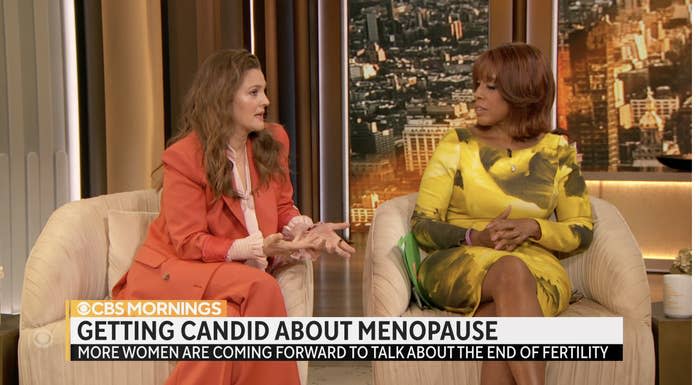
In this particular clip — from the episode that aired on March 22 — co-host Gayle King and CBS News correspondent Nikki Battiste were in conversation with Drew Barrymore, and they were discussing perimenopause. It stopped me in my tracks!
@cbsmornings How did Drew Barrymore know she was in perimenopause? She tells Gayle King and Nikki Battiste one of the main symptoms she experienced. Watch their full conversation tomorrow on CBSMornings. #drewbarrymore #gayleking #menopause #perimenopause #fertility #health
? original sound - CBS Mornings
Now, I am a woman in my 30s who has had a menstrual cycle for well over a decade now, and while I have heard the word "perimenopause" before, I admittedly could not have told you the first thing about it or what it means to actually experience it. And if we're really being honest here, I also don't know that much about menopause itself. Or how these two things differ. Suffice to say, I was immediately tuned in to this video.
In the clip, both King and Barrymore open up about their experiences with menopause and perimenopause respectively. Barrymore tells King, "I realized that I was in perimenopause when I started having my period every two weeks."
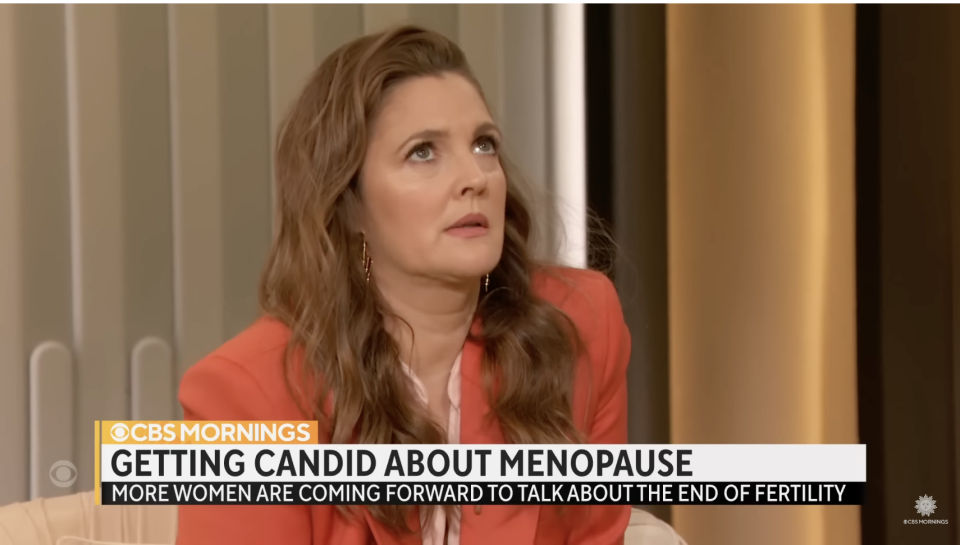
"Was it a heavy flow? That's a sign," King chimed in. "Yes, like a teenager," Barrymore said. Barrymore continued, "One doctor also just told me, like, this could last, on the worst case scenario, 10 years. And I was like, 'I will never make it 10 years like this.'" King also admitted that, like me, she had never even heard the phrase perimenopause until a visit to the doctor.
And King opened up about her own experience with menopause and the reaction that symptoms from these conditions — like hot flashes — can garner from the public. "I've been on the red carpet where photographers say, 'Gayle, are you OK?' [and] I go, 'It's just a hot flash,' and they go, 'Oh, sorry, sorry, sorry.'"
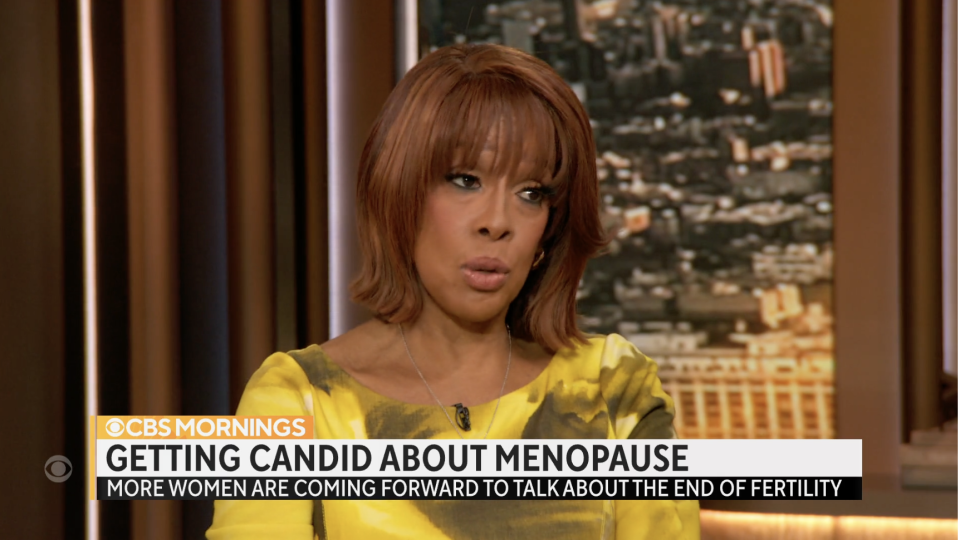
King noted that people sometimes respond "like they've said something very bad about you," King said, adding, "that's why I think it's good we're saying, 'Yes menopause, hot flashes, dry vagina.' It's all part of it." I could not agree more!
I was thrilled to see perimenopause and menopause being discussed in a real way. And a quick look at the comments section of the TikTok video showed that I was definitely not alone in this.
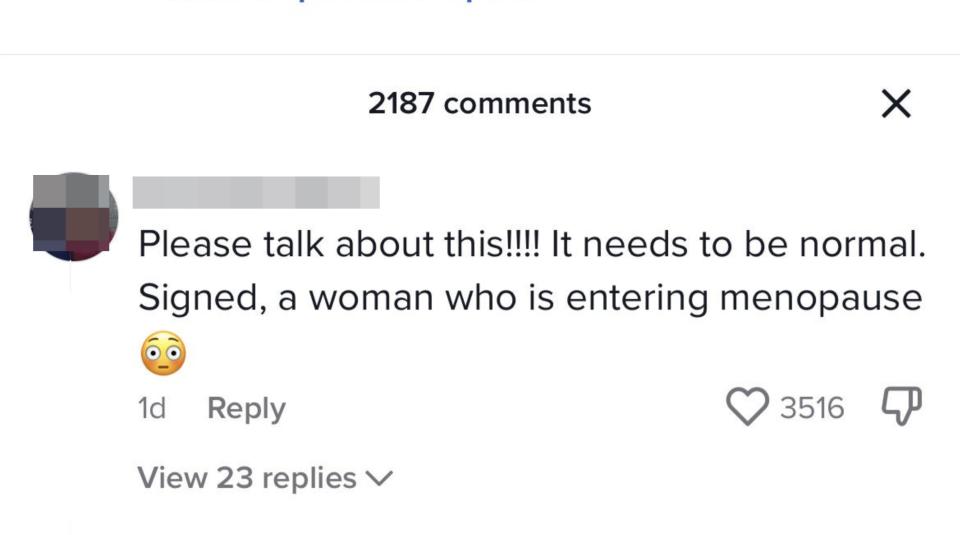
Like, why are women not taught these things?
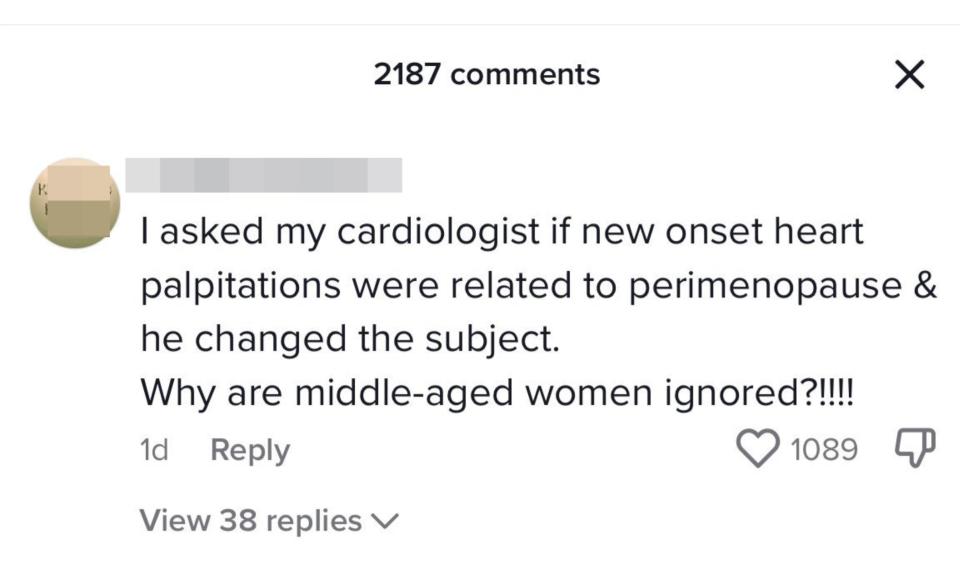
Why are we expected to suffer with little to no information about what is even happening?
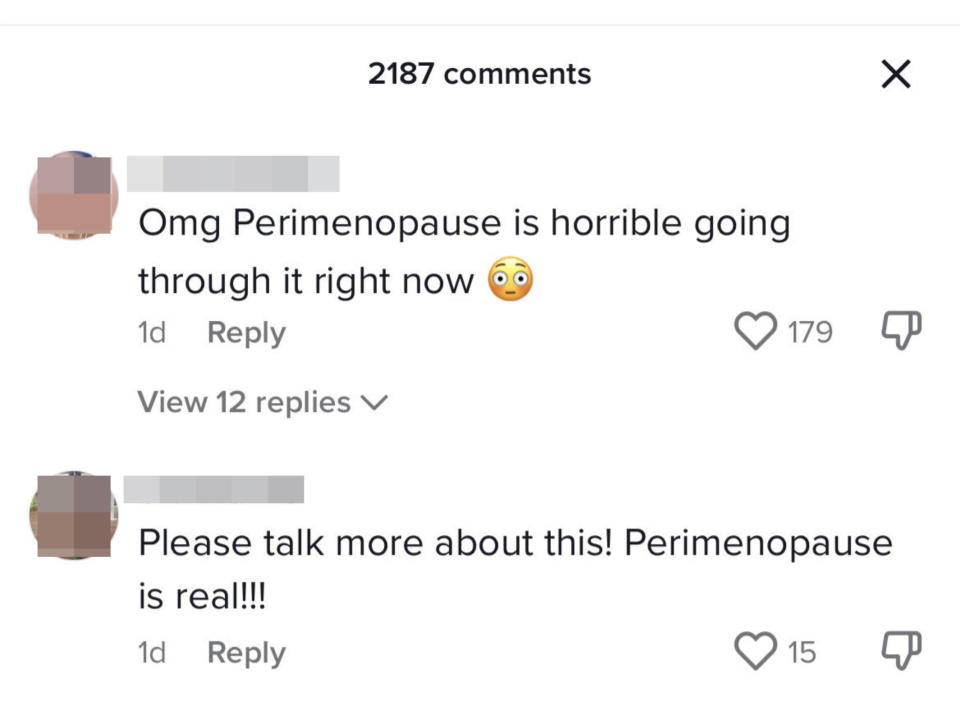
Seriously, at least prepare us!
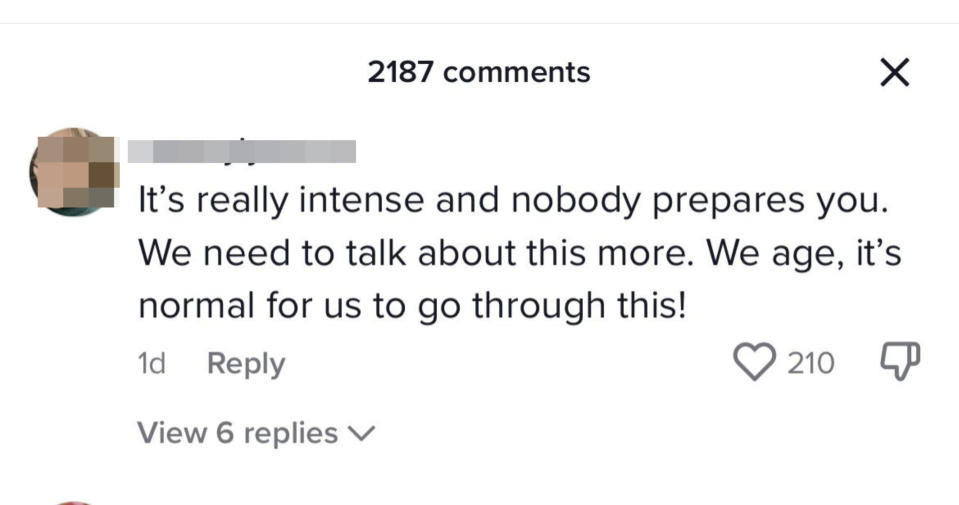
So, in order to get more information on perimenopause and menopause in general, BuzzFeed reached out to Dr. Marieme Mbaye (MD, FACOG), a practicing OB-GYN and the acting medical director for the virtual care service Noula, which combines at-home hormone testing with affordable care coaching and care plans with the aim of supporting people throughout their adult life, including during perimenopause and beyond.

First, what exactly is perimenopause? And how does it differ from menopause? Johns Hopkins Medicine defines perimenopause as, "the transitional time around menopause." During this time, your body: 1) releases eggs less regularly, 2) produces less estrogen and other hormones, and 3) becomes less fertile. Some people may also experience shorter and more irregular menstrual cycles during perimenopause.
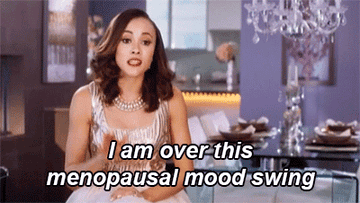
Bravo / NBC
The marker for entering menopause itself is when someone stops having periods for at least 12 consecutive months. Whereas with perimenopause, a menstrual cycle will still exist, even if erratic and irregular. And, says Dr. Mbaye, it's important to note that since menopause technically only refers to having had no period for 12 months, it's more of a milestone at one point in time. Postmenopause is usually what people mean when they refer to menopause as a longer stage — that is the phase you stay in for the rest of your life after you've reached menopause.
I knew that menopause would eventually be something everyone who has a period would go through, but suddenly, I started to wonder...is perimenopause something I am going to experience as well? And the answer is: Yes, I will. According to Dr. Mbaye, "Anyone who menstruates and has ovaries will go through perimenopause at some point, but everyone will experience it differently. Some people might have life-disrupting symptoms while others might not really notice any symptoms at all."
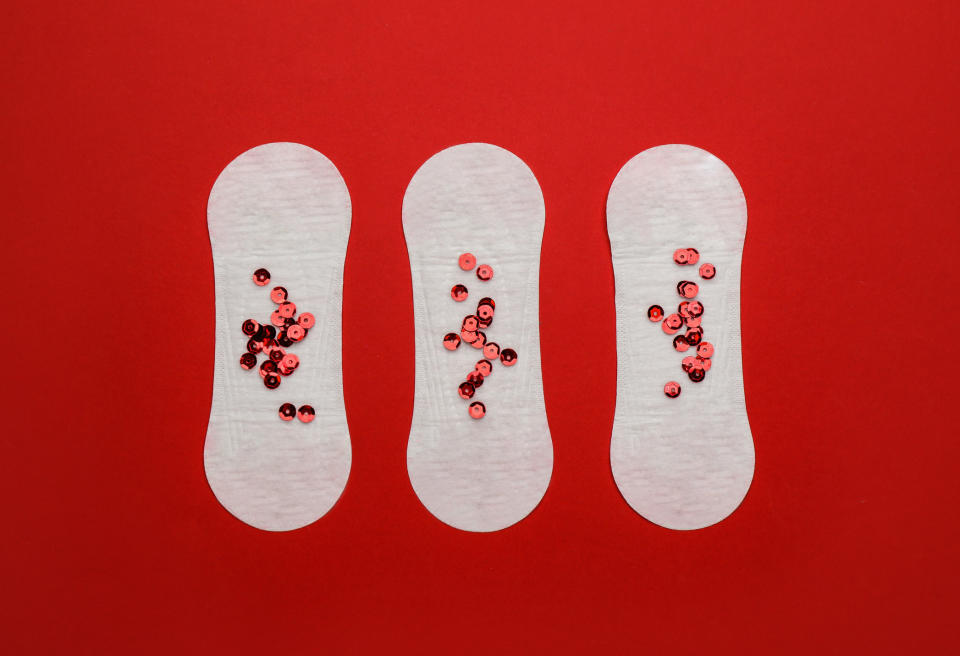
Dr. Mbaye also shared that the average age of menopause is around 51 in white people and 49 in Black and Latin people. Whereas perimenopause symptoms usually begin between ages 45 to 55, though they can start in the late 30s in rarer cases. And, says Dr. Mbaye, perimenopause any younger than 35 is rare and often a result of surgery where the ovaries had to be removed.
In terms of being able to identify if and when you, yourself, are experiencing perimenopause, Dr. Mbaye shared that "there are more than 30 symptoms associated with perimenopause, including irregular periods." But, says Dr. Mbaye, the four most common symptoms to be on the lookout for are: hot flashes, poor sleep, vaginal dryness, and mood changes. Dr. Mbaye continued, telling BuzzFeed, "Hot flashes and night sweats affect about 80% of people experiencing menopause transition. Other things to pay attention to are brain fog or difficulty concentrating, hair and skin changes, sore joints, difficulty losing weight, and digestive problems."
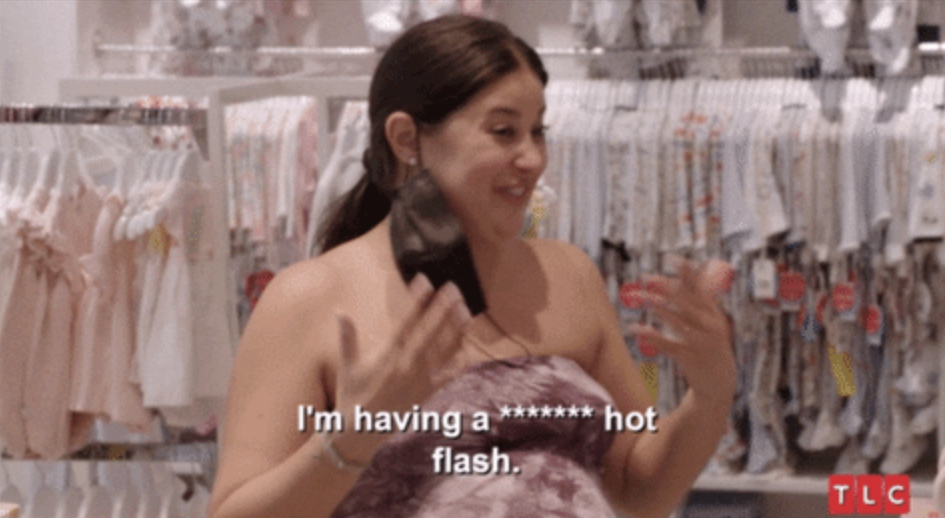
As for how long these symptoms may last? Dr. Mbaye shared that perimenopause can last anywhere from months to a decade, though the average time a person will experience perimenopause is four to five years.
So, if you've found yourself experiencing symptoms that feel in-line with perimenopause, what can you do? "First," says Dr. Mbaye, "exercising regularly and not smoking are two of the best things you can do on your own that will help manage symptoms. Beyond that, there are lots of hormonal and non-hormonal medical treatments that can manage a range of symptoms."
Therapy is also an important tool, emphasizes Dr. Mbaye, especially for people who have more significant mood changes during this phase. Dr. Mbaye also shared that "if your symptoms are bothersome to you, bring them up to your doctor so they can then go through the options that are safe for your specific case." She continued, "All perimenopausal symptoms are treatable if they're bothersome, but they don’t need to be treated. It's always up to the patient whether or not they feel the need to treat anything."
As for what the general public should understand when it comes to perimenopause, Dr. Mbaye wanted to remind us all that while perimenopause does mean that a person's fertility is declining, you can still get pregnant! So, until you've gone the full 12 months without a period, don't take any chances unless you're OK with that outcome. Some people will go on hormonal birth control to take care of their symptoms and prevent pregnancy in one go, says Dr. Mbaye.

And, continued Dr. Mbaye, while there's often concern about using hormone replacement therapy or birth control to treat perimenopausal symptoms, all hormonal medications need to be assessed on an individual basis to make sure the benefits outweigh the risks for that particular patient. But, she continued, when these options are used safely and correctly, "they can honestly help people so much with managing their symptoms and improving their quality of life."
And finally, says Dr. Mbaye, it's crucial that we all keep in mind that "menopause has always been depicted as this awful experience where we lose our femininity or are no longer useful to (our patriarchal) society, which is ridiculous when you think about how much life we still have left to live after menopause."
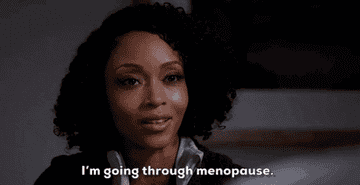
NBC/ Wolf Entertainment / Via giphy.com
Dr. Mbaye continued that she prefers to reframe menopause as a fresh start or a rebirth of sorts. "It should be empowering for us to go through this completely natural part of life and come out of it no longer tied to our menstrual cycles. I love that more celebrities are talking about this and more articles are coming out with people's experiences because the more people know what to expect and that there are treatments available, the less scary and overwhelming the whole experience will be when it comes." I could not agree more, Dr. Mbaye.
And, finally, says Gayle King at the end of the segment on CBS Mornings, "When you think of menopause...you think; 'Old. Her life is over. She's done.'" But, continues King, "What we know is that's just not true. If there's any message we could get across, I think that would be the one that would be the most helpful."
Thank you to Gayle King and Drew Barrymore for having this discussion, and a special thank you to Dr. Mare Mbaye for helping us learn more about these conditions.
And here's to a future where we learn these things about our bodies before it starts happening to us!
